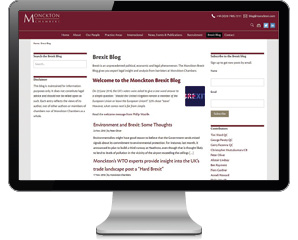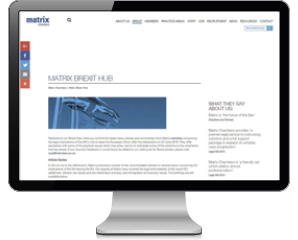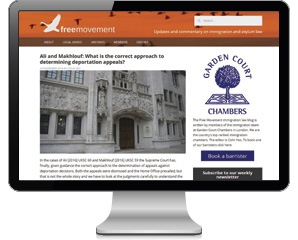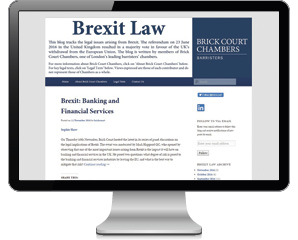*/
Following the capsizing uncertainty generated by Brexit, the general public and businesses are increasingly looking for answers. No surprise, then, that the Bar has become a rich source of reliable and politically neutral information on a wide range of complex legal issues, deciphering events as they happen. Counsel brings you the cream of the Brexit Bar blog crop


Philip Woolfe,
Monckton Chambers
Brexit is an unprecedented political, economic and legal phenomenon. There has never been a case before of a modern economy as complex as Britain’s unwinding from a political relationship as close as that with the European Union.
The decision to start the Monckton blog was made immediately after the referendum as part of a wider Brexit strategy to respond to client needs and concerns. Although it aims principally to cover the topics that concern our client base, which includes both companies and policy makers, it is also a resource for anyone who may be interested. We believe that it’s in the public interest to try to make publicly available some objective information about the legal framework within which Brexit will unfold.
In the blog, we focus on the legal aspects of Brexit – looking at how the rights of companies and individuals may be affected, but also looking in particular at those areas where domestic, European and international law defines the framework within which the political process will unfold. We aim to provide objective insight and analysis – looking at what the law is, not what politicians on both sides of the debate might like it to be.
We highlighted the blog via an initial e-newsletter and then Twitter and more significant posts are treated as website news items. Journalists have been made aware of the blog, including through a press briefing we held in Chambers on 11 October, two days before proceedings began in the Gina Miller challenge. Over 60 press contacts, representing legal, political and business interests were invited to meet with the three members of chambers involved in the case. As a direct result of this briefing, Monckton members were asked for press comment with members quoted in The Times, The Financial Times, The Guardian, the BBC, The Economist and other media. Our most significant interview was with Laura Kuenssberg, Political Editor of the BBC. She spoke with George Peretz QC and in the article on the BBC website, she linked to one of George’s blog posts. This resulted in over 4,000 direct click throughs from the BBC website to the article in less than two weeks. Ninety-three per cent of these visitors had never been on the Monckton website before.
The success of the blog, which currently has around 400 subscribers, is shown by the fact that about 25% of our current website traffic over the past few months was to the blog or to a blog post-related news item on the website. This equates, in just the last month to over 20,000 page views, which is undoubtedly a significant increase on pre-Brexit statistics.
We intend to continue to use our experience in representing both government and major companies and unsurpassed expertise in European law, as well as strengths in other relevant areas, such as WTO law and judicial review, to create original content which is objective but also adds a depth of insight which readers cannot get elsewhere.


Natalie Hearn,
Project Manager, Matrix
Not long after the EU referendum, Matrix launched its Brexit Hub: a dedicated section of our website to store news items, press interviews, articles and commentary from our members. It was a progression of our marketing campaign before the vote, where we produced a series of ten articles on the potential impact of Brexit on different areas of law. We published them on our website and sent them to our clients on a weekly basis. The feedback to our series was very encouraging, and it complemented our series of three popular seminars in the run-up to the referendum, which focused on international trade, the reformation of the EU and responding to political developments.
After the vote and in response to this quickly developing area, we widened our remit to what content we would provide our clients and not limit ourselves to longer, more complex articles. Our members were being featured in the news, speaking as part of event panels, being interviewed by the press, writing on various topics, and representing the claimant parties in the Art 50 legal challenge, recently heard in the Supreme Court. The hub allows us to collate all this content under one wide umbrella. We felt this would work better than a blog, which many of other chambers have created, because it includes not just opinions and commentary, but other interesting media. The hub works by dynamically pulling together any resources from our website containing the word ‘Brexit’ into one place, so it is easy for us to maintain and provide regularly updated content.
We took the view that Matrix was in a position to provide valuable perspectives on Brexit issues because of our practice diversity. We like to focus on the interactions between different areas and not just have the members of our EU law team contribute but, for example, members practising in international trade, public law, immigration and employment law.
Our Brexit hub is consistently in our most popular pages visited on our site month to month, as well as giving us engaging social media content for our Twitter account.


Colin Yeo,
Garden Court Chambers
Free Movement offers updates and commentary on immigration and asylum law. I started writing the blog anonymously in 2007 and put my name and chambers on it in 2012. These days it gets over 200,000 page views a month, and Brexit has caused a significant increase in readership. The name of the blog made that almost inevitable. We had over 325,000 page views in June 2016.
I practise across immigration and asylum law but have a particular interest in EU law. Brexit has caused me to focus on that topic more and more. There are just so many anxious EU nationals and family members out there right now and I try to offer advice on process and procedure as well as more meaty legal issues. It is often EU law topics that attract the most readers and I periodically go back to refresh those blog posts to make sure they are up to date and relevant. This helps push us up search engine results, and we also get quite a lot of traffic from Facebook.
Free Movement is aimed primarily at ‘users’ of immigration law rather than law makers but we carry strong campaigning material as well. As editor I was invited to give evidence in Parliament on the Immigration Act 2016 and I know that policy makers and researchers draw on the information we put out there.
It is unusual amongst legal blogs because not only do lawyers and judges read it but so too do members of the public. It is hard to write for both audiences, but there is a lot of overlap of interest. A simply expressed and well-structured blog post – the hardest kind to write – is essential for members of the public but also much easier for lawyers to digest.
The core of the website remains useful, free legal information. The number of free articles is limited to 15 per month now and paying readers can also access training courses and forums. We have over 11,000 email subscribers and ebook guides, a new video link advice service and an application checking service are available. The blog drives a significant number of public access enquiries into chambers.

Brick Court Chambers Brexit Law

Maya Lester QC, Brick Court Chambers
The blog was launched in late June 2016, just days after the referendum. In six months over 600 followers have registered, and the Brick Court Twitter account has over 3,700 followers. There have been over 33,000 views of the posts since the blog’s inception. The audience includes clients, including solicitors and general counsel, journalists, other barristers, and legal commentators including bloggers. The remit of brexit.law is to provide analysis, expertise and information in relation to the legal issues arising from the Brexit referendum. Its chief objective is to provide our clients (and anyone else with an interest in Brexit) with analysis by members of chambers who are experts in European law and in other areas of law affected by Brexit. (A number of members of chambers were heavily involved in the origins of European law in the United Kingdom and its development from the 1970s onwards so they are extremely well placed to comment on the implications of leaving the EU.) It also aims to encourage debate and provide up-to-date information, and to highlight the expertise of members of chambers more generally.
Every post on the blog is tweeted, put on LinkedIn and sent to contacts by members of chambers. Readers enter their email addresses for free updates. All of the key legal and financial journalists of whom chambers is aware are following the blog; members of chambers regularly respond to telephone calls and emails asking for further comment and information on the posts and related topics. The URL brexit.law is used as the hashtag for live tweeting at the series of Brick Court Brexit panel discussions which are each attracting audiences of 200-300. Each discussion is filmed and posted on the blog and on the Brick Court website.
We do not seek to influence the political debate, but to provide high quality, reliable and useful input into the legal issues.

UK Human Rights Blog and RightsInfo

Adam Wagner,
One Crown Office Row
Brexit is a huge national issue and it is influencing content on both RightsInfo and the UK Human Rights Blog. We try to cover issues of public interest that have a connection to rights law and Brexit could have a profound effect on rights in the UK.
The key issues are likely to be rights at work, many of which are anchored by many years of EU law, as well as free movement of people, environmental law (which the UKHRB in particular has a sideline in covering) and issues relating to the EU Charter.
RightsInfo focuses on explaining legal issues to lay people, ie those with little or no knowledge of the law, in a clear and engaging way. For example, we covered the Divisional Court’s Art 50 ruling through a ‘plain English’ explainer of the case and an engaging video. The video lasts less than two minute but distils the essential facts about the judgment; it has already been viewed over 50,000 times.
LAW FIRM OFFERINGS: A SELECTION OF BREXIT BLOGS


Philip Woolfe,
Monckton Chambers
Brexit is an unprecedented political, economic and legal phenomenon. There has never been a case before of a modern economy as complex as Britain’s unwinding from a political relationship as close as that with the European Union.
The decision to start the Monckton blog was made immediately after the referendum as part of a wider Brexit strategy to respond to client needs and concerns. Although it aims principally to cover the topics that concern our client base, which includes both companies and policy makers, it is also a resource for anyone who may be interested. We believe that it’s in the public interest to try to make publicly available some objective information about the legal framework within which Brexit will unfold.
In the blog, we focus on the legal aspects of Brexit – looking at how the rights of companies and individuals may be affected, but also looking in particular at those areas where domestic, European and international law defines the framework within which the political process will unfold. We aim to provide objective insight and analysis – looking at what the law is, not what politicians on both sides of the debate might like it to be.
We highlighted the blog via an initial e-newsletter and then Twitter and more significant posts are treated as website news items. Journalists have been made aware of the blog, including through a press briefing we held in Chambers on 11 October, two days before proceedings began in the Gina Miller challenge. Over 60 press contacts, representing legal, political and business interests were invited to meet with the three members of chambers involved in the case. As a direct result of this briefing, Monckton members were asked for press comment with members quoted in The Times, The Financial Times, The Guardian, the BBC, The Economist and other media. Our most significant interview was with Laura Kuenssberg, Political Editor of the BBC. She spoke with George Peretz QC and in the article on the BBC website, she linked to one of George’s blog posts. This resulted in over 4,000 direct click throughs from the BBC website to the article in less than two weeks. Ninety-three per cent of these visitors had never been on the Monckton website before.
The success of the blog, which currently has around 400 subscribers, is shown by the fact that about 25% of our current website traffic over the past few months was to the blog or to a blog post-related news item on the website. This equates, in just the last month to over 20,000 page views, which is undoubtedly a significant increase on pre-Brexit statistics.
We intend to continue to use our experience in representing both government and major companies and unsurpassed expertise in European law, as well as strengths in other relevant areas, such as WTO law and judicial review, to create original content which is objective but also adds a depth of insight which readers cannot get elsewhere.


Natalie Hearn,
Project Manager, Matrix
Not long after the EU referendum, Matrix launched its Brexit Hub: a dedicated section of our website to store news items, press interviews, articles and commentary from our members. It was a progression of our marketing campaign before the vote, where we produced a series of ten articles on the potential impact of Brexit on different areas of law. We published them on our website and sent them to our clients on a weekly basis. The feedback to our series was very encouraging, and it complemented our series of three popular seminars in the run-up to the referendum, which focused on international trade, the reformation of the EU and responding to political developments.
After the vote and in response to this quickly developing area, we widened our remit to what content we would provide our clients and not limit ourselves to longer, more complex articles. Our members were being featured in the news, speaking as part of event panels, being interviewed by the press, writing on various topics, and representing the claimant parties in the Art 50 legal challenge, recently heard in the Supreme Court. The hub allows us to collate all this content under one wide umbrella. We felt this would work better than a blog, which many of other chambers have created, because it includes not just opinions and commentary, but other interesting media. The hub works by dynamically pulling together any resources from our website containing the word ‘Brexit’ into one place, so it is easy for us to maintain and provide regularly updated content.
We took the view that Matrix was in a position to provide valuable perspectives on Brexit issues because of our practice diversity. We like to focus on the interactions between different areas and not just have the members of our EU law team contribute but, for example, members practising in international trade, public law, immigration and employment law.
Our Brexit hub is consistently in our most popular pages visited on our site month to month, as well as giving us engaging social media content for our Twitter account.


Colin Yeo,
Garden Court Chambers
Free Movement offers updates and commentary on immigration and asylum law. I started writing the blog anonymously in 2007 and put my name and chambers on it in 2012. These days it gets over 200,000 page views a month, and Brexit has caused a significant increase in readership. The name of the blog made that almost inevitable. We had over 325,000 page views in June 2016.
I practise across immigration and asylum law but have a particular interest in EU law. Brexit has caused me to focus on that topic more and more. There are just so many anxious EU nationals and family members out there right now and I try to offer advice on process and procedure as well as more meaty legal issues. It is often EU law topics that attract the most readers and I periodically go back to refresh those blog posts to make sure they are up to date and relevant. This helps push us up search engine results, and we also get quite a lot of traffic from Facebook.
Free Movement is aimed primarily at ‘users’ of immigration law rather than law makers but we carry strong campaigning material as well. As editor I was invited to give evidence in Parliament on the Immigration Act 2016 and I know that policy makers and researchers draw on the information we put out there.
It is unusual amongst legal blogs because not only do lawyers and judges read it but so too do members of the public. It is hard to write for both audiences, but there is a lot of overlap of interest. A simply expressed and well-structured blog post – the hardest kind to write – is essential for members of the public but also much easier for lawyers to digest.
The core of the website remains useful, free legal information. The number of free articles is limited to 15 per month now and paying readers can also access training courses and forums. We have over 11,000 email subscribers and ebook guides, a new video link advice service and an application checking service are available. The blog drives a significant number of public access enquiries into chambers.

Brick Court Chambers Brexit Law

Maya Lester QC, Brick Court Chambers
The blog was launched in late June 2016, just days after the referendum. In six months over 600 followers have registered, and the Brick Court Twitter account has over 3,700 followers. There have been over 33,000 views of the posts since the blog’s inception. The audience includes clients, including solicitors and general counsel, journalists, other barristers, and legal commentators including bloggers. The remit of brexit.law is to provide analysis, expertise and information in relation to the legal issues arising from the Brexit referendum. Its chief objective is to provide our clients (and anyone else with an interest in Brexit) with analysis by members of chambers who are experts in European law and in other areas of law affected by Brexit. (A number of members of chambers were heavily involved in the origins of European law in the United Kingdom and its development from the 1970s onwards so they are extremely well placed to comment on the implications of leaving the EU.) It also aims to encourage debate and provide up-to-date information, and to highlight the expertise of members of chambers more generally.
Every post on the blog is tweeted, put on LinkedIn and sent to contacts by members of chambers. Readers enter their email addresses for free updates. All of the key legal and financial journalists of whom chambers is aware are following the blog; members of chambers regularly respond to telephone calls and emails asking for further comment and information on the posts and related topics. The URL brexit.law is used as the hashtag for live tweeting at the series of Brick Court Brexit panel discussions which are each attracting audiences of 200-300. Each discussion is filmed and posted on the blog and on the Brick Court website.
We do not seek to influence the political debate, but to provide high quality, reliable and useful input into the legal issues.

UK Human Rights Blog and RightsInfo

Adam Wagner,
One Crown Office Row
Brexit is a huge national issue and it is influencing content on both RightsInfo and the UK Human Rights Blog. We try to cover issues of public interest that have a connection to rights law and Brexit could have a profound effect on rights in the UK.
The key issues are likely to be rights at work, many of which are anchored by many years of EU law, as well as free movement of people, environmental law (which the UKHRB in particular has a sideline in covering) and issues relating to the EU Charter.
RightsInfo focuses on explaining legal issues to lay people, ie those with little or no knowledge of the law, in a clear and engaging way. For example, we covered the Divisional Court’s Art 50 ruling through a ‘plain English’ explainer of the case and an engaging video. The video lasts less than two minute but distils the essential facts about the judgment; it has already been viewed over 50,000 times.
LAW FIRM OFFERINGS: A SELECTION OF BREXIT BLOGS
Following the capsizing uncertainty generated by Brexit, the general public and businesses are increasingly looking for answers. No surprise, then, that the Bar has become a rich source of reliable and politically neutral information on a wide range of complex legal issues, deciphering events as they happen. Counsel brings you the cream of the Brexit Bar blog crop


Now is the time to tackle inappropriate behaviour at the Bar as well as extend our reach and collaboration with organisations and individuals at home and abroad
A comparison – Dan Monaghan, Head of DWF Chambers, invites two viewpoints
And if not, why not? asks Louise Crush of Westgate Wealth Management
Marie Law, Head of Toxicology at AlphaBiolabs, discusses the many benefits of oral fluid drug testing for child welfare and protection matters
To mark International Women’s Day, Louise Crush of Westgate Wealth Management looks at how financial planning can help bridge the gap
Casey Randall of AlphaBiolabs answers some of the most common questions regarding relationship DNA testing for court
Maria Scotland and Niamh Wilkie report from the Bar Council’s 2024 visit to the United Arab Emirates exploring practice development opportunities for the England and Wales family Bar
Marking Neurodiversity Week 2025, an anonymous barrister shares the revelations and emotions from a mid-career diagnosis with a view to encouraging others to find out more
David Wurtzel analyses the outcome of the 2024 silk competition and how it compares with previous years, revealing some striking trends and home truths for the profession
Save for some high-flyers and those who can become commercial arbitrators, it is generally a question of all or nothing but that does not mean moving from hero to zero, says Andrew Hillier